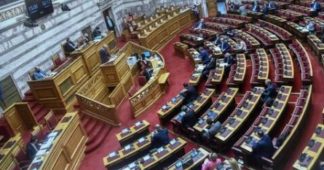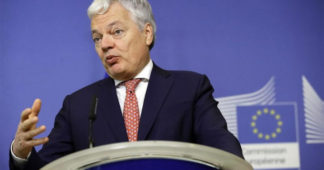By Manolis Kottakis
June 26, 2025
The raid by the European Prosecutor’s Office on various offices of organizations and public services in Crete, the OLAF investigation in collaboration with the European Prosecutor’s Office into the offices of OSE (Hellenic Railways Organization) regarding the “unknown” Contract 635, the raid by European prosecutors on municipal offices across the country for reasons that will soon be revealed, and finally the case files transmitted to the Greek Parliament by Laura Codruța Kövesi—all underline one thing and one thing only: How justice functions when it is truly independent. The powerful feel its breath. The public interest is its priority. Can we recall, I wonder, any similarly spectacular actions by Greek Justice in the last twenty years without prior judicial requests from abroad? Very few. Everyone whispers about the scandals around them, but the country remains engulfed in vast silence.
With the exception of the massive investigation conducted by investigator Dimitris Foukas into the wiretapping case against Kostas Karamanlis—which, through lawful interceptions, even identified an agent of an allied power who had bugged the phones of the country’s prime minister—no major case has been investigated on the independent initiative of Greek judicial authorities. None has reached trial.
The Siemens case, where we know who were involved, was handed over to Greek Justice only after the German company’s “entanglement” with American authorities. Having bribed half the planet, Siemens provocatively sought to list on the New York Stock Exchange to raise capital there! Thus, it fell into the Americans’ trap—Americans who were fed up with Germans stealing their business twenty years after President George H.W. Bush blessed Germany’s reunification. That’s how this case reached Greece. Here, the corrupt defendants short-circuited the system with an investigative committee like the one Kyriakos is now using to drag out the OPEKEPE case, and the bribed politicians never apologized. In the end, they even granted amnesty to the participants with the new Penal Code they all voted for in the summer of 2019 under pressure from Berlin. The trials were “abolished.”
How did the “Lagarde list” case (correctly called the “Falciani list,” after the UBS employee who leaked European tax evaders’ deposits to the U.S.) reach Greek Justice? Because the then-IMF managing director sent it to the Greek Finance Minister to tax the powerful during the Memorandums, not just the weak. That’s why Greek Justice half-heartedly dealt with it, leading only to the conviction of a former minister for document tampering. Had the Americans not pursued Europeans over tax havens, would we have ever learned anything? Obviously not.
The same applies to the Novartis case, which, like it or not, was a major scandal. If it weren’t, the multinational wouldn’t have settled for paying a massive fine in New York for unethical and illegal practices. Thus, Greek Justice was forced to handle this case, the full story of which will only be written many years from now—when the guilt of some in their old age won’t let them take their buried secrets to the grave.
The same holds true today. Would we have learned anything about OPEKEPE had the European Prosecutor’s Office not launched lawful interceptions (wiretaps) and sent the case file to Parliament? No. We wouldn’t have known about this or about Contract 717, which was not included in the Bakaimis case file. Kövesi had the courage to prosecute top executives of construction firms. Kövesi now has the courage to send a case file naming two ministers, 12 MPs, dozens of officials, and private individuals whose companies have “passive” shareholders but “active” criminal liabilities—key figures of the Greek oligarchy. And when she transmits the audit mandate she’s preparing to OLAF (European Anti-Fraud Office), just wait. What happened with ERGOSE the other day will repeat: raids.
I struggle to recall the last time Greek Justice independently ordered a preliminary inquiry that evolved into a full investigation into a very, very, very big issue in recent years. After a newspaper exposé? After an agency’s complaint? Anything. If my memory fails and I’m missing something, someone correct me. I fear I’m not.
The tragedy is that we, Greece, one of the oldest members of the European Union, rush to discredit the work of European institutions. The prime minister, before even seeing Kövesi’s case file on pastures and subsidies, rushed to claim the issue was “European.” But no other European country was asked to investigate potential ministerial responsibilities. The issue is purely Greek. His plan to avoid another preliminary inquiry and another independent judge is to resort to the “we all ate together” doctrine—equating the favors his and other parties’ MPs sought from OPEKEPE with subsidies and the millions in EU funds wasted by the Greek government and ministries in his home region.
We are, unfortunately, a pitiful country. With pitiful leadership.
Published in the Greek newspapers Dimokratia and Esti
Translated from Greek by Christian Haccuria
Read also: Greek Ministers resign | Defend Democracy Press
We remind our readers that publication of articles on our site does not mean that we agree with what is written. Our policy is to publish anything which we consider of interest, so as to assist our readers in forming their opinions. Sometimes we even publish articles with which we totally disagree, since we believe it is important for our readers to be informed on as wide a spectrum of views as possible.











